Spring 2023 108
2 Situation report | 4 A tale of two clinics In Afghanistan, two urgent night-time journeys have a surprising outcome | 6 On the hunger roads Illustrator Camille Quilichini reports from the ongoing malnutrition crisis in Niger | 10 When the lean season starts An MSF team in Nigeria try to stabilise a malnourished boy. But things are more complicated than they seem… | 12 ‘We are standing strong’ In Ukraine MSF teams treat those who have been left behind | 14 ‘Why I never say “no” to an assignment’ How a brush with death inspired one man’s lifesaving career
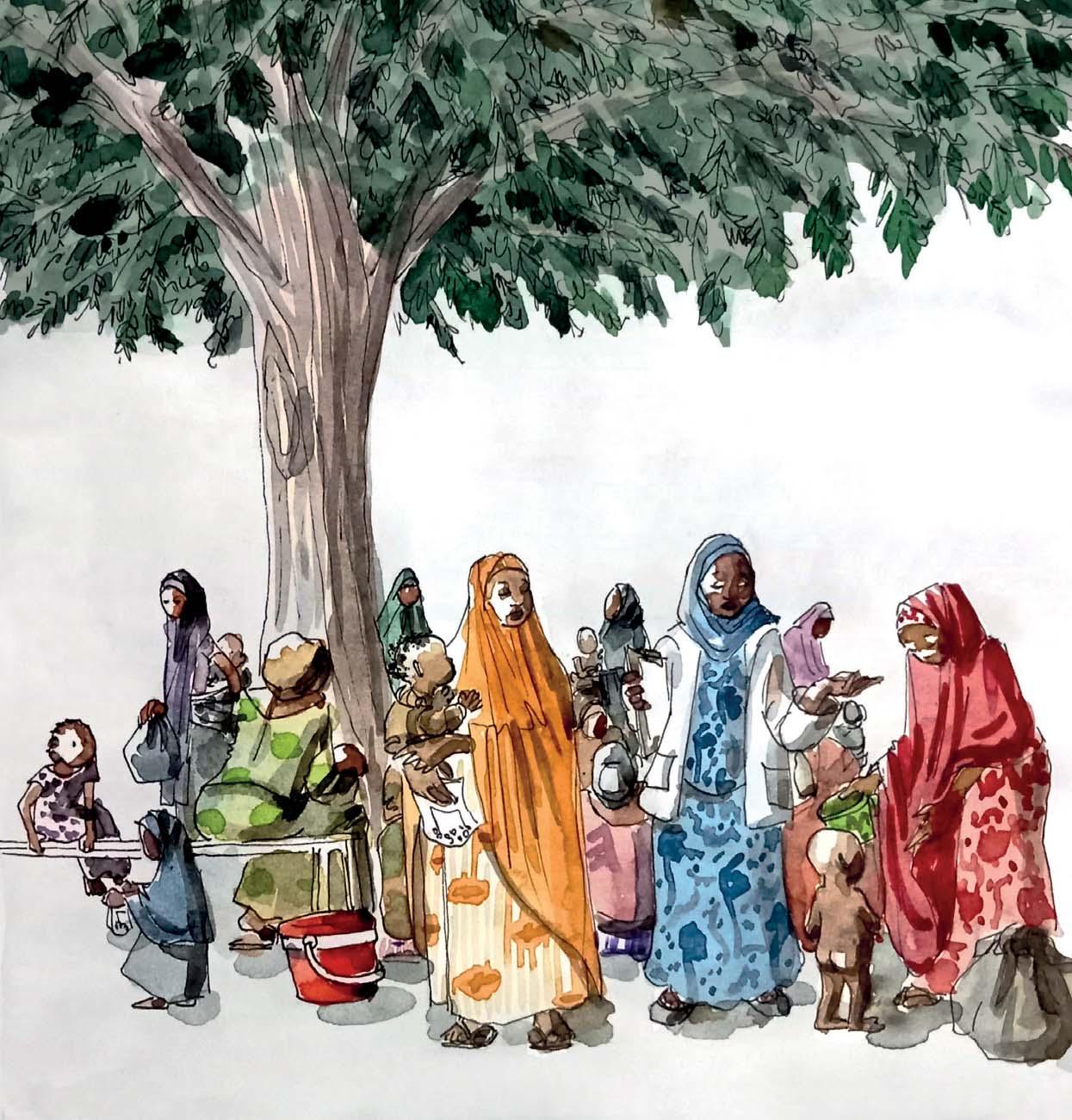
SITUATION REPORT

42,000


Following an outbreak of cholera, MSF has sent mobile teams to the Bekaa Valley and north Lebanon to vaccinate people and provide information about how to prevent the waterborne disease from spreading. Cholera causes diarrhoea and dehydration, but with prompt treatment, more than 99 per cent of people make a full recovery. Lebanon is in the grip of an economic crisis; its water infrastructure is crumbling and there are serious shortages of diagnostic tests and medical supplies, all of which could exacerbate the outbreak.

August destroyed their home. “The situation is still an emergency,” says Syed Israr Ali Shah, MSF emergency project coordinator. Our mobile medical teams are treating high numbers of people with malaria, diarrhoea and respiratory tract infections and seeing concerning numbers of people with malnutrition.” MSF teams are also distributing essential relief items and helping to restore water and sanitation infrastructure. Thirty-three million people were affected by

2 | DISPATCHES 2 5 4 3 1
1. LEBANON
Carmen Yahchouchi
Number of people MSF teams have treated for malaria following the flooding in Pakistan
2. PAKISTAN
A member of MSF’s health promotion team talks to a family in Karachi
Zahra Shoukat
An MSF medical team cross the Baudó river in Colombia’s Chocó region to run mobile clinics for people cut off from medical care. In the past year, clashes between armed groups have made it

from indigenous communities to move around the region in safety and to reach markets, schools and health facilities.
2,000 Number of babies delivered each month at Boost hospital in Afghanistan
Baby Rayes, who was born soon after midnight on 31 December at Boost hospital, Lashkar Gah, staff in 2023. Boost hospital, in Afghanistan’s Helmand province, is one of MSF’s largest medical projects, with more than 2,000 babies delivered there each month.

An MSF hygienist hangs decontaminated boots out to dry at an Ebola treatment centre in Mubende, Uganda. The Ebola on 11 January. A total of 142 people contracted the disease; 87 of them recovered and 55 died.

MSF’S UK VOLUNTEERS
Afghanistan: Diana Pereira De Sousa, Nurse; Deirdre O’Donnell, Doctor; Darran Martin, Nurse; Louis Dowse, Project coordinator
Bangladesh: Joy Clarke, Doctor; Nicodeme Zirora, Finance manager; Katharine Smeaton-Russell, Nurse
Central African Republic: Eleanor Harvey, Pharmacist; Edward Plank, Hospital facilities manager
Chad: Shannon Fluck, Logistician; Leah Kenny, Advocacy manager
Democratic Republic of Congo: Mark Blackford, Finance coordinator
Egypt: Leila Younes, Health promoter
Ethiopia: Ruth Zwizwai, Epidemiologist; Paul Critchley, Head of mission; Cara Brooks, Deputy head of mission; Charles Hardstone, Water & sanitation manager; Jennifer Hulse, Doctor; Nijole Kymelyte Slapsinskaite, Nurse; Richard Maltman, Logistician
Haiti: Jean Marie Vianney Majoro, Project coordinator; Amy Mikhail, Research coordinator; Emily Hewitt, Health promoter; John Boase, Logistician; Mariana Goncalves, Water & sanitation manager
India: Angus De Wuilton, Doctor; Claire Mason, Doctor; Kirsty Metz, Nurse
Indonesia: Roger Teck, Head of mission
Iraq: Milena Beauvallet, Finance & HR manager
Jordan: Yolanda Vazquez Suarez, Activity manager
Kenya: Paul Banks, Procurement manager
Kyrgyzstan: Rebecca Welfare, Deputy head of mission
Libya: Federico Luca Ilio Franconi, Logistics manager
Mexico: Lindsay Solera-Deuchar, Activity manager
Mozambique: Jill Powis, Finance & HR manager; Robin Aherne, Logistics manager
Myanmar: Corinne Linnecar, Humanitarian ; Joan Hargan, Medical team leader; Zoe Bennell, Field communications manager
Netherlands: Edward Taylor, Deputy head of mission
Nigeria: Clare Atterton, Nurse; Moses Soro, HR manager
Pakistan: William de Glanville, Epidemiologist; Kate Thompson, Finance coordinator
Palestinian Territories: Helen OttensPatterson, Head of mission
Russia: Sarah Clowry, Advocacy manager Sierra Leone: Thomas Duggan, Logistician; Stephen Payne, Learning manager; Jessica Comi, Nurse; Molly Brammer, Midwife
South Sudan: Benedict Porter, Doctor; Sarah Hoare, Nurse; Alice Tindal Carill Worsley, Nurse; Fabian Erwig, HR coordinator; Ana Moral Garcia, Midwife; Erin Lever, Midwife; Nabiha Essaji, Doctor
Sudan: Elizabeth Wait, Health promoter; Hanadi Katerji, Nurse; Michael Kalmus Eliasz, Doctor; Rowena Neville, Doctor
Tajikistan: Philippa Lowth, Nurse; Karl Flynn, Logistician
Ukraine: Timothy Hammond, Medical coordinator; Florentina Popa, Midwife
United Kingdom: Beatrice Blythe, Health promoter
Venezuela: Maria Zavala San Andres, Nurse; Guy Millington, Logistician; Robert Allen, Construction manager; Sylvia Kennedy, Nurse
Yemen: Fionnuala Ryan, Paediatrician
Zimbabwe: Caroline Bradley, Mental health supervisor; Michael Parker, Project coordinator
SPRING 2023 | 3
3. COLOMBIA
4. AFGHANISTAN
Santiago Valenzuela
5. UGANDA
Sam Taylor
MSF
A tale of two clinics
Iwas raised near the city of Lashkar Gah, in Helmand province, Afghanistan. This is the story of two journeys I made, a couple of years apart, but closely connected.


It is the summer of 2008. It is midnight and I am just falling asleep when there is loud knocking at the door.
My uncle is on the doorstep. ‘Start the car,’ he says, ’we have to go somewhere.’
I don’t know where we are heading. But I do as my uncle says and start driving through the dark, following his directions.
We drive to a poor neighbourhood on the outskirts of the city and stop outside a house. A woman and a man are waiting for us.
My uncle instructs me to fold down the seats so the woman can lie down. As they help her into the back of the car, I see she is heavily pregnant.
Soon I am driving carefully in the dark along bumpy roads towards the city centre, crossing different checkpoints, answering different questions.
An hour and a half later, we arrive at the entrance to a large, dark hospital compound. ‘What are you doing? Why are you here?’ asks the guard. We explain and finally he waves us inside. It is difficult to tell where to go: there is no driveway, no lights, just a lot of trees and fallen branches. Eventually we find our way to the main hospital building.
A guy with a traditional oil lamp approaches and asks why we are there. He points towards a dark hallway. There is no stretcher or wheelchair and no one to help. All around is a big silence. All you can hear are the sounds of the woman in pain. The building smells of open wounds and alcohol. At least the smell is a sign that we are not the only ones here – there are other
4 | DISPATCHES AFGHANISTAN WORDS
RAHMATULLAH ALI JANI PHOTOGRAPHY ORIANE ZERAH
patients behind the closed doors. We walk along the hallway in the dark, pressing random buttons on our old analogue phone to get enough light to see a metre ahead of us and avoid bumping into the walls.
Finally we reach the maternity department. A lady approaches, also with an oil lamp, and asks why we are here, so we lose more time explaining again. Finally she says: ‘Wait here and I’ll try to find the midwife on duty.’
She reappears to tell us the midwife is not in the hospital, but says she will go to the midwife’s house.
Half an hour later they are back. The midwife greets us very nicely. She takes the pregnant woman inside. After ten minutes she comes back out with a list of items, saying: ‘In this hospital, we can support the delivery, but we don’t have any medication or supplies. You have to purchase everything yourselves from a pharmacy.’
Then the lady with the lamp asks us: ‘Why would you bring her to this hospital, not to a private clinic? You know there is no infrastructure here.’
My uncle replies: ‘They cannot afford a private clinic. That’s why they are here.’

My uncle and I jump in the car and go to search for a pharmacy. After a good hour, we finally find one which is open. We get everything on the list and head back to the hospital.
As the night goes on, the midwife needs more supplies, so we have to repeat this trip a couple more
times, until early in the morning at last there is good news: the baby has been born, and both mother and baby are healthy. There is no postnatal care on offer, so we take them straight home.
A couple of years later, I get a similar phone call. But this time I am expecting it, as it’s my aunt who is pregnant. Just as before, it’s coming up to midnight when we hit the road.
The checkpoints are still there, and so is the bumpy road, but when we arrive at the hospital compound, the gate opens automatically and we are driving down a paved road straight to the main entrance.
Instead of total darkness, this time I see a massive white gate and a building with lots of lights. I’m shocked. ‘Are we in the right place?’ I ask. ‘Are you sure this is the hospital we want to go to?’
We enter the building and people give us directions – we don’t even have to ask. Some women appear with a stretcher and take my aunt inside. One stays with me to explain what will happen next, how long it will take, that it will be safe and that I shouldn’t worry.
To be honest, I barely hear anything she says because I am so distracted by everything else. It is midnight and yet it is as bright as daylight. I am thinking: ‘What is happening? Is this a different place? Am I on a different planet?’
All around me I can see signs pointing to the various departments: the emergency room, the lab, radiology, paediatrics. It is an amazing experience to see the changes to the hospital, which is now supported by MSF.
It is no coincidence that, about a year later, I apply to join MSF as an HR learning and development officer; I’ve worked for MSF ever since.
But my story doesn’t end there. Late last year, there was a change of power in Lashkar Gah, with active shooting, fighting and rockets in the city for ten days.
I was on assignment with MSF outside Afghanistan, but I kept in touch with colleagues in the city. They told me: ‘Yeah, there’s fighting outside the hospital building but we’re in the basement, still treating patients.’


I could hardly believe it, but it was true.
Today, MSF is there still, in my hometown of Lashkar Gah, supporting the hospital and treating patients.
I am lucky enough to have seen the hospital’s ‘before’ and ‘after’. On my first visit, many years ago, the team could barely deliver one baby. Today, they’re delivering more than 2,000 babies every month.”
SPRING 2023 | 5
Samina (centre), aged six months, waits with her mother and two other women to see a doctor at Boost hospital.
Rahmatullah Ali Jani is an HR professional and is currently working as an HR officer with MSF based in the UK.
WATCH ALI SHARE HIS STORY AT MSF.ORG.UK/MSFJOURNEY
ON THE HUNGER ROADS
A MALNUTRITION CRISIS IS UNFOLDING IN PARTS OF NIGER AND NORTHWEST NIGERIA. ILLUSTRATOR CAMILLE QUILICHINI TRAVELLED TO THE REGION TO DOCUMENT THE SITUATION.

6 | DISPATCHES
















8 | DISPATCHES
Tens of thousands of children across parts of Niger and northwest Nigeria are at risk of severe malnutrition. Poor harvests, rising food costs, outbreaks of malaria and escalating violence have exacerbated the already precarious situation in which many families live.
MSF launched an emergency response in the region in June last year; since then our teams have treated 115,000 children for malnutrition.
TO SEE ALL OF THE ILLUSTRATIONS IN ‘ON THE HUNGER ROAD’ SERIES, VISIT MSF.ORG.UK/HUNGERROADS





SPRING 2023 | 9
DR NNAMDI ATHESTAN NWEKE
GEORGE OSODI
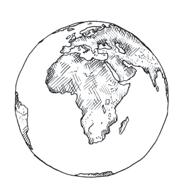
WHEN THE LEAN SEASON STARTS
WHEN A LITTLE BOY ARRIVES AT MSF’S MALNUTRITION TREATMENT CENTRE IN KATSINA, THE TEAM HOPE TO STABILISE HIM QUICKLY. BUT THINGS ARE MORE COMPLICATED THAN THEY SEEM, SAYS DR NNAMDI ATHESTAN NWEKE .

here are several signs that a child has severe acute malnutrition, and little Musa had all of them.
Musa’s mother Fatima had brought him to her local MSF outpatient team when his fever and cough got worse. They weighed him, measured the circumference of his upper arm and checked for fluid accumulation in his feet. The results were clear: Musa had severe acute malnutrition.
He was quickly transferred to the inpatient centre where I am based. We started him on a therapeutic milk especially formulated for severely malnourished children. Next we needed to treat his medical complications. However, the little boy was now struggling to breathe. We feared pneumonia…
I’m part of the MSF team in Katsina, in northwest Nigeria. Malnutrition is a year-round problem here but the worst time is when the food from the previous harvest runs out and the ‘lean season’ begins.
The area is also hit regularly by armed conflict. This makes it difficult for people to farm their land and means that vaccinations for diseases associated with malnutrition – like measles – often don’t happen.
It’s a devastating combination: last year in Katsina state MSF treated more than 107,000 children for malnutrition; 13,000 were so ill they needed inpatient care.
MSF has six feeding centres where parents bring their children for regular check-ups and collect supplies of therapeutic food to take home. But feeding on its own is
not enough. Children with malnutrition are more likely to become ill with other diseases – and much more likely to die from these diseases – than well-nourished children. Because of this, it’s crucial that we provide medical services too.
This is how Musa came to us.
With the right care, children with pneumonia usually start to recover in three to five days. But after seven days, Musa was still severely unwell. His body looked even smaller beneath his oxygen mask.
At this point, Fatima got a call from home. Another of her children was seriously ill. She told us that she and Musa needed to get back to their village as quickly as possible. She was hopeful that he was well enough to make the journey.
Carefully, we explained to Fatima that this was not the case. We had tried Musa on three different antibiotics and he was still very sick; he was also still reliant on oxygen therapy. We now suspected that he had tuberculosis (TB), which has very similar symptoms to severe pneumonia.
Fatima had an impossible decision to make. I guessed at what she might be thinking: if Musa was too unwell to survive, it might be better to return home now to give the other child a better chance. But if there was hope…
As a doctor you can’t make any promises. Still, as I told Fatima about the TB treatment we wanted to try, I felt like I was giving her my word.
10 | DISPATCHES
WORDS
NIGERIA
PHOTOGRAPHY
At last we agreed: we would try the new drug and review the situation in two days.
Two days. At least it was something.
We started Musa on the new medication. Twenty-four hours later he was breathing well enough to be taken off oxygen. However, he still had a high fever. Progress, but not the remarkable recovery we needed.
On day two, Fatima hadn’t been able to get any news from home. She was anxious to leave.
It felt like a gamble. Musa’s temperature was still high. But Fatima’s bags were packed. So together we made a plan. We would give Fatima the TB medication and she would follow the instructions as closely as a trained nurse. And she would bring Musa back for a check-up as soon as possible.
It was all we could do.
I knew that a follow-up visit might not be easy. Many of our patients travel long distances to reach our centre and transport is expensive. The challenges are so significant that many families don’t return at all.
As Fatima left with Musa in her arms, I sincerely hoped our plan would work.
After one week, they were back. Musa’s fever had gone and Fatima was very cheerful: her other child had

made a full recovery. Fatima’s determination during a difficult few weeks had left a deep impression on me. But she didn’t stop there.
A couple of weeks later, Fatima walked into the centre. With her was a well-nourished little boy holding a book bag. It took me a moment to realise it was Musa.
She’d come to say thank you and to show us how Musa was doing. They were continuing to get support from the outpatient team, and the frail boy of a few weeks earlier was now well enough to go to school.
Sometimes people ask me how our team avoid losing hope. In the peak of the malnutrition season, it’s stories like this which keep us motivated.
There are so many children like Musa: we don’t forget any of them.” *Names have been changed.
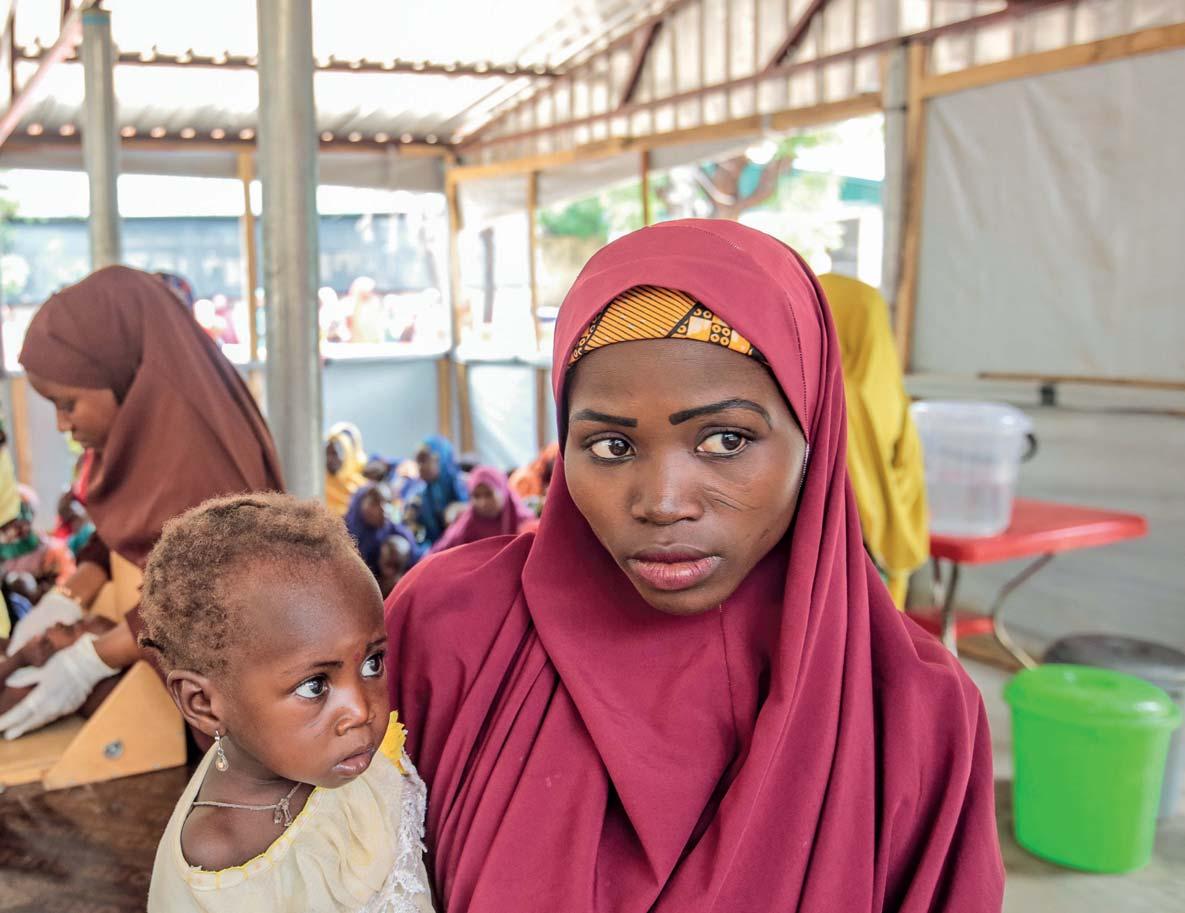
SPRING 2023 | 11
Dr Nnamdi Athestan Nweke is medical activities manager at MSF’s malnutrition project in Katsina, northwest Nigeria.
Aisha (right) waits for a doctor to assess her child for malnutrition at Kofar Murusa in Katsina state.
“It took me a moment to realise it was Musa.”
are standing strong’
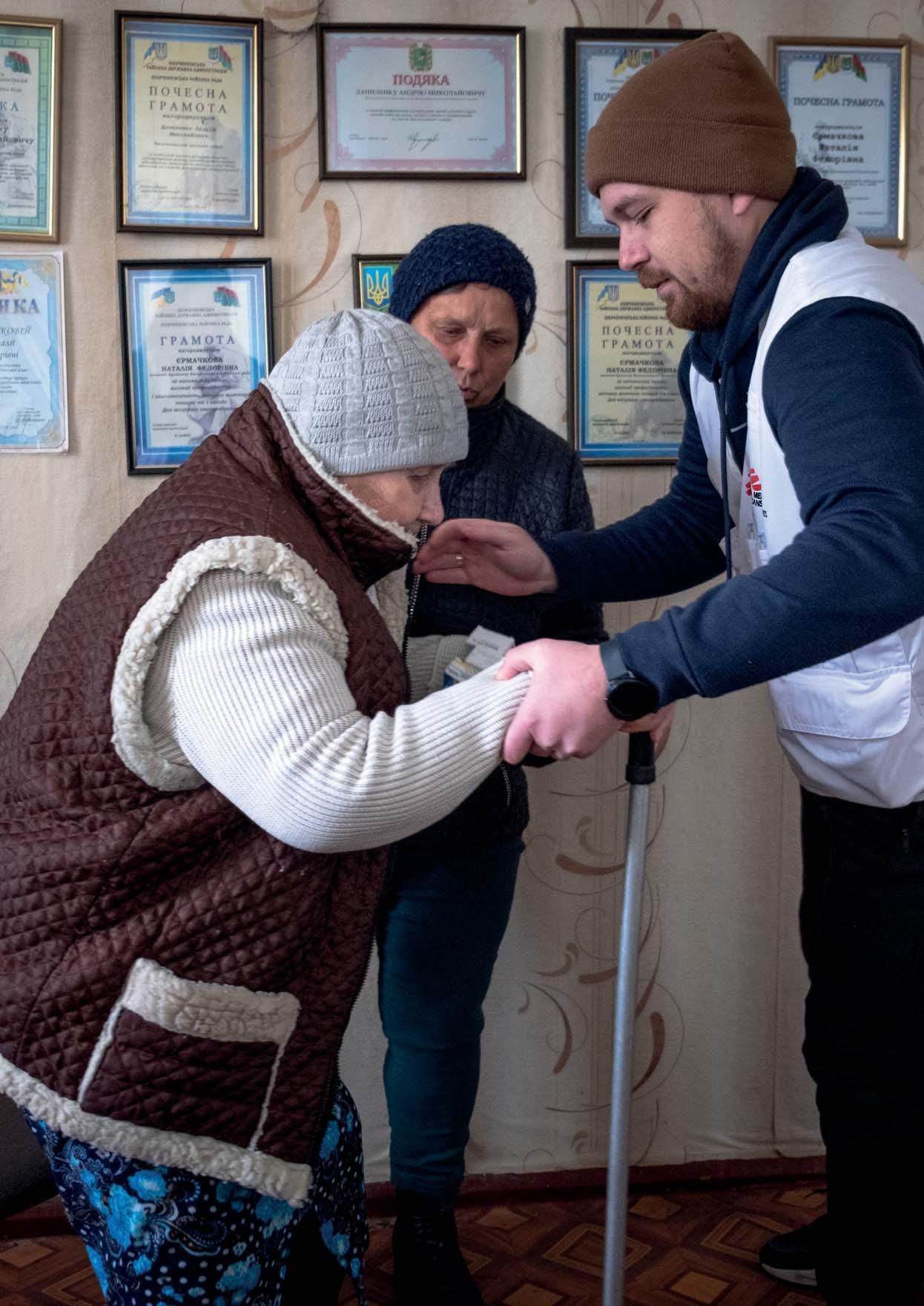
‘We
When the war arrived, I was sitting close to my window,” says 68-year-old Raisa, who lives in the village of Yakovenkove.
“I heard explosions. Rows of tanks began to move forward. Later, we tried to figure out what to do next: how to eat, how to tend our gardens. We tried to get used to the situation, but it was impossible to get used to this amount of shelling. Shooting all night and all day. It was terrible.”
Raisa has been speaking to one of the psychologists from MSF’s mobile clinic.
“I came to see the psychologist because I still can’t sleep,” says Raisa. “In the darkness of night, rockets are flying over the buildings. It’s very scary. It’s destroying my nervous system.”
Raisa is one of those who stayed. Caught up in the middle of the fighting, these predominantly elderly or disabled Ukrainians coped by turning their cellars into bomb shelters and sharing scant food with neighbours, while enduring the near-continuous shelling.
One year on, the Ukrainian army has regained control of these areas, but people’s medical and mental health needs are still high.
A CLINIC ON THE MOVE
“One elderly woman walked for half an hour to reach our clinic,” says MSF’s Dr Gino Manciati. “That isn’t easy when you have mobility problems. When she arrived, she told us that she hadn’t come for herself, but to get medication for her husband.”
Gino is medical team leader of MSF’s mobile clinic, which travels from village to village on a four-week rota. Today they’re in Vasylenkova, where the health centre was destroyed in the shelling months ago.
Most of the patients at the clinic are babushkas – older women and grandmothers. Many of them are living with untreated chronic illnesses alongside psychological conditions caused by months of fear, loss and isolation.
“We are seeing very high levels of blood pressure, such as 200 over 100, compared to a regular reading of 120 over 80,” says Gino.
High blood pressure can lead to serious complications, says Gino, including sight loss, kidney
failure, neurological impairment and even sudden death. “In another context, these patients would be hospitalised,” he says. “Here it’s just not possible.”
Helping people bring their medical conditions back under control is a big part of the team’s work.
Seventy-year-old Valentyna is also here to see the psychologist. Her son was killed by a landmine. “This war took my health and my son,” she says. “I am exhausted. I wake up horrified and see him in front of me. Now he is gone and my life is over.”
Many of the older women who come to MSF’s clinics feel isolated, abandoned and lonely. Grieving the loss of family members and the life they knew, many report feeling that their lives no longer have purpose. Anxiety and hopelessness are common.
“We hear elderly women tell us that they feel like the last years of their lives have been stolen from them,” says Camilo Garcia, who manages the mental health side of the mobile clinic.
Although the mental health needs of people in this region are high, Camilo believes that their inner strength will help them cope and recover.
“They decided to stay in their villages despite the fighting and despite the bombs,” he says. “They have defended their right to stay where they belong, which takes courage. The babushkas of Ukraine have a hidden power: resilience.”
At the mobile clinic in Yakovenkove, Raisa has finished her session with the psychologist. “It’s hard to live through this,” she says, “but we are standing strong.”
Maria, who has diabetes, is helped to her feet by MSF’s Dr Igor Bodnia at a mobile clinic in eastern Ukraine.
SPRING 2023 | 13
AS THE RUSSIAN ARMY TOOK CONTROL OF TOWNS AND VILLAGES ACROSS UKRAINE’S KHARKIV REGION IN LATE FEBRUARY 2022, MANY RESIDENTS HAD ALREADY LEFT TO FIND SAFETY. BUT NOT EVERYONE WAS ABLE OR WILLING TO LEAVE…
“The babushkas of Ukraine have a hidden power: resilience.”
Linda Nyholm
‘Why I never say “no” to an assignment...’
WHEN VE OULAI DENIS WAS OFFERED A JOB WITH MSF IN WAR-TORN CÔTE D’IVOIRE, HE TURNED IT DOWN. TWO DECADES LATER, THE NURSEANAESTHETIST HAS TREATED THE INJURED IN ALMOST EVERY MAJOR CONFLICT IN AFRICA AND THE MIDDLE EAST.
Ihave been part of the MSF team for 20 years. I have done 35 assignments in countries around the world, including 10 years in my home country, Côte d’Ivoire.
I see MSF as part of my identity, part of my family’s identity and even part of the identity of my community and country.
But I didn’t always feel this way.
Back in 2002, there was a war in Côte d’Ivoire. MSF took on the running of the hospital where I worked in Bouaké. I am a nurseanaesthetist, which means I trained as a nurse before specialising in anaesthetics and resuscitation. MSF offered me a job in the surgical team. I said no.
My wife, who is a midwife, began working with the MSF team and encouraged me to join them. I told her I was not ready. I wasn’t ready to treat people involved in the fighting.
MSF is neutral and impartial in war zones. That means we make decisions about who to treat based on their medical needs alone. If a fighter is the person who most needs medical care, they will be the first person to receive it.
Once, twice, I was approached by MSF with offers of a job, but each time I stood my ground. Then something changed my mind.
The rainy season brought a severe spike in malaria cases. A lot of children got sick. I knew how serious it was. One of the MSF coordinators called me
and said: ‘We’re starting a paediatric service. Come and be part of it.’

That was on Saturday lunchtime. By 3 pm I was part of the team.
At first the role didn’t involve anaesthetics, but I didn’t mind. In fact, I would have done that job for nothing, because children are innocent in war. Children are among the most vulnerable people in the community, but they are also the future of our entire nation.
I spent seven years working with MSF in Bouaké, preparing children for surgery as part of the anaesthetics team. After that I spent three years as a nurse-anaesthetist in an MSF project in the west of Côte d’Ivoire. Then in 2012 I was offered an international assignment with the MSF team in Central African Republic.
Since that day in 2012, I’ve never said ‘no’ to an assignment. And it’s not only because I believe in the work. I have another reason.
Eight months after I took that first role with MSF, my wife almost lost her life. She was pregnant with our daughter and needed a caesarean. Not long after the operation, there was a complication and she started to haemorrhage.
The MSF team rushed her to the operating theatre and carried out emergency surgery to stop the bleeding while I waited outside. I spoke to the team afterwards and I know the surgery wasn’t easy. They went through many bags of blood trying to save her life. At last she was
14 | DISPATCHES
An MSF medic takes a break between patients at Anyama hospital in Côte d’Ivoire.
moved to the recovery room. I will never forget waiting for her to wake up and how it felt when she opened her eyes and recognised me.
If it wasn’t for MSF, that day I would have lost part of myself: my wife and my daughter.
After Central African Republic, it was Mali. After Mali, it was Democratic Republic of Congo, Nigeria, Liberia, South Sudan, Afghanistan, Lebanon, Haiti and Iraq. Anaesthetics specialists generally do short, intense assignments, so I’ve worked in many of these countries multiple times.

In Iraq, I helped set up two projects: in East Mosul and West Mosul. We were doing all kinds of surgeries –traumatic injuries caused by the conflict, paediatric surgery, emergency care for pregnant women.
One day a patient arrived at our hospital in East Mosul with a pelvic fracture. He needed
to be transferred to Erbil, 80 km away, for specialist treatment.
The problem with a pelvic fracture is that even the slightest movement causes unbearable pain, which meant the transfer by ambulance would be excruciating for the patient.
I had worked in anaesthetics for a long time by this stage and was familiar with techniques which weren’t normal practice in Mosul at that time.
I talked it through with the medical team and the patient and we agreed that we would do what’s known as a ‘nerve block’. This meant injecting local anaesthesia near the sciatic nerve so that part of his body would be numbed.
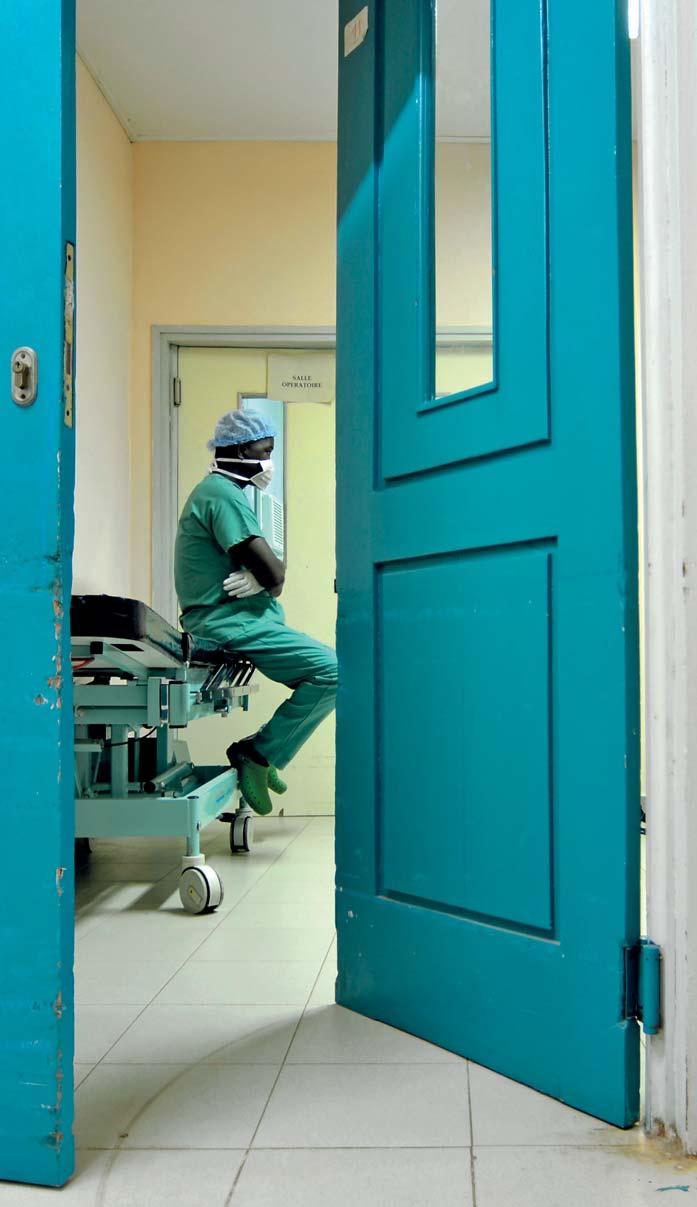
The nerve block worked and the patient made it to Erbil safely and without pain. When it was time for him to come back, they sent me to Erbil to repeat the procedure. I did the nerve block and rode back with him in the ambulance. On the journey we talked a lot and ever since that day we’ve been close friends. We message each other every day. He runs a family business now, but before his injury he was a military man.
Twenty years ago I didn’t feel ready to treat people involved in perpetuating a terrible war. Today, I look back at my career and I realise I have worked in practically every conflict in Africa and many in the Middle East. Wherever I go now I’m involved in teaching others. I teach anaesthesia, my area of expertise. But I also teach the importance of treating everyone, based on medical needs alone.”
SPRING 2023 | 15
“Today, I look back at my career and I realise I have worked in practically every conflict in Africa and many in the Middle East.”
Ve Oulai Denis is a nurse-anaesthetist who has worked for MSF in over a dozen countries, including Côte d’Ivoire, Iraq and Haiti.
Nicola Vigilanti
Médecins Sans Frontières/Doctors Without Borders (MSF) is a leading independent humanitarian organisation for emergency medical aid. In more than 70 countries worldwide, MSF provides relief to the victims of war, natural disasters and epidemics, irrespective
MSF was awarded the 1999 Nobel Peace Prize.
TEL 020 7404 6600
ADDRESS Médecins Sans Frontières, Chancery Exchange, 10 Furnival Street, London EC4A 1AB
@msf_uk msf.unitedkingdom
Eng Charity Reg No.1026588
Cover image: An MSF medic (in white jacket) talks to mothers and their malnourished children at an outpatient feeding centre in Niger.
© Camille Quilichini
ABOUT Dispatches is written by MSF staff and sent out quarterly to our supporters to keep you informed about our medical work around the world, all of which is funded by you. Dispatches gives our patients and staff a platform to speak and epidemics in which MSF works.

It is edited by Marcus Dunk. It is printed on recycled paper and costs £0.76 to produce, package and send using the cheapest form of post. It is an important source of income for MSF and raises three times what it costs to produce. We always welcome your feedback. Please contact us using the methods listed, or email: dispatches.uk@london.msf.org
SIGN UP TO EMAIL
Get the latest MSF news delivered to your inbox. Sign up at msf.org.uk/signup
MAKE A DONATION
You can donate by phone, online or by post. If possible please quote your supporter number (located on the top left-hand side of the letter) and name and address.
LEAVING A GIFT IN YOUR WILL
Have you thought of remembering MSF in your will? Any gift is welcome, however large or small. For more information, contact Shona Barnes at: shona.barnes@london.msf.org or call us on 020 7404 6600
CHANGING YOUR ADDRESS
Please call 020 7404 6600 or email: uk.fundraising@london.msf.org
CHANGING A REGULAR GIFT
To increase or decrease your regular gift, please call us on 020 7404 6600 or email: uk.fundraising@london.msf.org with your request. Please also get in touch if your bank details have changed.
If you would like to stop receiving communications from us, please contact our Supporter Care team on 020 7404 6600 or email uk.fundraising@london.msf.org and we’ll be happy to help. Thank you for your support.
An MSF medic puts on personal protective equipment (PPE) for treating patients with Ebola at MSF’s training centre in Brussels.
Pierre Fromentin


















































